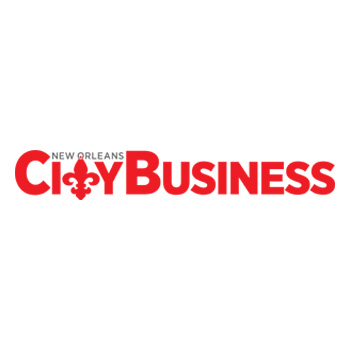A local bioscience startup says it has found early success in its technology to protect against COVID-19 and other airborne diseases.

The Ion Virus Defender. Photo courtesy Henley Ion
The New Orleans-based company, Henley Ion, recently completed testing on the first prototype of its Ion Virus Defender, a mask designed to provide respiratory protection without the use of conventional filtration that can make breathing difficult. It removed 99.8% of SARS-CoV-2 bioaerosols under testing conducted at the Tulane National Primate Research Center in Covington, a news release said.
Unlike typical face masks which use filtration to try and catch as many particles as possible when a person inhales, the Ion Virus Defender uses micronized electrostatic precipitation to remove infectious bioaerosols from both inhaled and exhaled air. The mask also provides a tight seal to the wearer’s face by using medical grade silicon.
Henley Ion CEO Skipper Bond said the company is in talks with manufacturers of personal protective equipment to produce the device. It’s designed to integrate with currently existing products, such as a powered air purifying respirator used in health care settings, respirators that use filtration and also helmets worn by military personnel and emergency responders.
Bond, a partner at New Orleans public relations firm Bond Moroch before forming Henley Ion, declined to give specifics on how much capital and investment it took to get the product off the ground. He said local and out-of-state investors are involved, and a second prototype will be tested at Tulane’s North Shore facility for efficacy against SARS-CoV-2 in addition to tuberculosis, the flu and MRSA.
“We think the quickest way to the market is through a joint venture or partnership with these manufacturers who can either integrate it into existing equipment or help us produce our mask,” he said.
He created the company after meeting Dr. Julian Henley, a Harvard-trained physician and specialty surgeon who first developed the technology to combat anthrax threats post-9/11.
Henley said he received encouraging testing data during that time, but the technology was shelved because “nobody was interested in anthrax protection.” Fast forward to the COVID-19 pandemic, and Henley wanted to bring it back as a different approach to removing particles. Henley Ion is also working on a way to use it in HVAC systems.
Henley eventually sold his home in Colorado to move to New Orleans, where the company is headquartered.
“I felt that I could do some good, and perhaps more than what I can do in a hospital,” Henley said.
Kuowei Chang, principal scientist and vice president of Massachusetts-based Industrial & Biomedical Sensors Corporation, has described the technology as “a clever incorporation of ionization and electrostatic precipitation principles I have worked with most of my professional life. The testing results, albeit preliminary, appear to be highly encouraging especially with the high level of particle rejection, low ozone production and minimal – if any – impediment to air flow.
“This novel adaptation and miniaturization of well-established and proven particle precipitation technology to bio-pathogen airway protective device appears to be promising and timely with emerging airborne viral pandemics we are all struggling with,” Chang wrote in response to Henley’s manuscript on the technology and its testing.
Henley Ion is the second bioscience startup in south Louisiana that is developing new ways to deal with COVID-19.
BioInfoExperts, a life science technology firm founded in Thibodaux in 2012, has created software to better understand transmission, outbreaks and infectious disease processes. The company’s platform, FoxSeq, investigates pathogen transmission and evolution by evaluating the genetic sequences of viruses, according to a story on Louisiana Economic Development’s website.
FoxSeq has been used by Ochsner Health, LSU Health Sciences Center and the New Orleans Department of Health to share data and report to the state Department of Health, which uses the information for monitoring and contact tracing.
Similar to Ancestry.com, which uses human DNA to understand where people come from, BioInfoExperts uses bacterial, fungul and viral RNA to find out where diseases originate so safety protocols can be improved, said Susanna Lamers, an epidemiologist who founded the company.
“The goal is to really be more proactive and understand the pathogens that are in our communities around us rather than always reacting to them,” she says in a video on LED’s website. “Understanding pathogen genomics, using our technology, provides a lot of granular data so that we can target infectious diseases better.”
According to Louisiana Economic Development, More than 101,000 life sciences businesses currently employ 1.87 million people in the U.S., with annual workforce growth of 7.2% and average wages of $107,000 – both more than twice the national average.
Locally, startups like Axosim and Obtala Sciences have attracted the attention of investors and received infusions of capital in recent years.
LED secretary Don Pierson said he’s bullish on the life sciences sector because Louisiana has a strong foundation of existing industries to support its growth.
While there are no state incentives specifically tailored to attract such businesses, there are three schools that train physicians and scientists – LSU Health Sciences Center in Shreveport and New Orleans and Tulane Medical School.
There is also the Pennington Biomedical Research Center in Baton Rouge, the Tulane National Primate Research Center in Covington and the University of Louisiana at Lafayette New Iberia Research Center where startups can grow from. Pierson said another option is the New Orleans BioInnovation Center that gives startups a low-cost environment to continue their research, gain counseling on the business side of commercialization of their products and link them to sources of venture capital to grow.
“We have the basic building blocks that, if you look at this mosaic across the state, create opportunities,” Pierson said.
Credit: Source link



